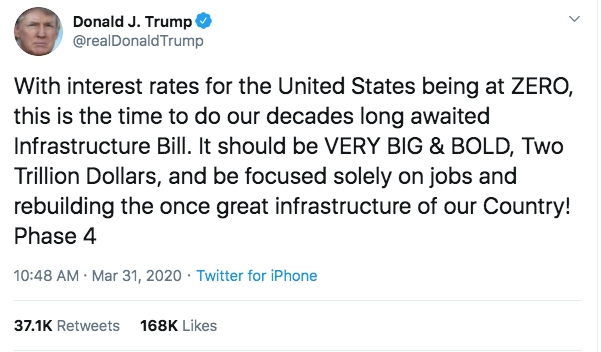Last Friday night (May 15), well after ETW had gone out, the House of Representatives passed H.R. 6800, the “Heroes Act” that would spend another $3 trillion or thereabouts to respond to the coronavirus and its impacts on the economy. The 208 to 199 vote wasn’t over until almost 9:30 p.m.
We were so busy reading through the bill itself and analyzing it (see our coverage here) that we didn’t take the time to read the fine print of the expected veto threat issued the day before by the White House Office of Management and Budget in the form of a Statement of Administration Policy on H.R. 6800.
Most of what was said in the SAP was completely predictable (saying the bill was full of “longstanding partisan and ideological wishlists” etc.), which is why we didn’t bother to read it last week.
But we should have, because the third paragraph in the SAP contained new parameters for what the Administration now says it wants out of the next coronavirus bill (emphasis added)
The Administration remains committed to working with Congress in a bipartisan manner to address any potential additional legislation needed to respond to the coronavirus outbreak. When additional legislation is contemplated, it should include a payroll tax holiday, safe-harbor provisions to protect businesses from frivolous lawsuits, permitting reform to facilitate infrastructure projects, and other policies to spur our economic comeback.
This is an interesting departure from what President Trump tweeted on March 31:

Although Trump mentioned infrastructure again a few more times in press appearances in the context of coronavirus response, Senate Majority Leader Mitch McConnell (R-KY) has repeatedly dismissed any attempt to tie significant infrastructure funding to coronavirus response. McConnell’s preferred plan is to combine the two infrastructure-related bills that everyone knew Congress was supposed to pass in 2020 anyway – the reauthorization of surface transportation programs now that the FAST Act is expiring, and the biennial water resources bill – and move that as one combined infrastructure package, separate from coronavirus response, and without emergency off-budget funding.
The line in the SAP about putting permitting reform – not infrastructure funding – in the next coronavirus bill can be seen as a sign that the White House has received McConnell’s message. But permitting reform wouldn’t have much measurable cost to the federal government, and it would expedite the rate at which regular infrastructure funds for new projects, if committed this year, would actually enter the economy and spur growth.
(One of the big reasons why modern infrastructure funding does not make particularly good countercyclical economic stimulus is that big capital projects take so long to get their permits – dollars committed now won’t enter the economy, for the most part, until after the current recession is over and the recovery is already in the process of happening.)
Putting permitting reform out there as a necessary precursor to increased infrastructure funding is an interesting strategy. Its success depends on how high a priority the Administration wants to place on it during negotiations next month on a new round of coronavirus response legislation. (It also depends on who is doing the negotiating for the Administration – if it is Treasury Secretary Mnuchin, as it has been for the last few bills, how invested will he be? The President’s top priority (as expressed publicly, at least) has been a payroll tax holiday, and McConnell’s self-stated top priority is legal liability protections for businesses open during coronavirus, both of which are also mentioned in the SAP.




